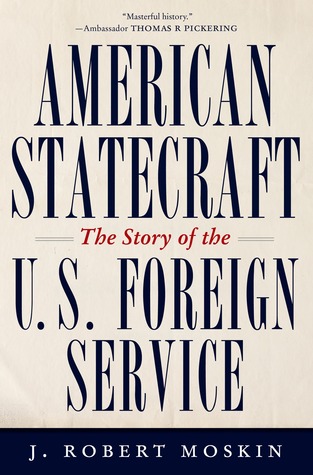Posted: Sept. 4, 2014
 American Statecraft is a fascinating and comprehensive look at the unsung men and women of the U.S. Foreign Service whose dedication and sacrifices have been a crucial part of our history for over two centuries. Fifteen years in the making, veteran journalist and historian Moskin has traveled the globe conducting hundreds of interviews both in and out of the State Department to look behind the scenes at America’s “militiamen of diplomacy.”
American Statecraft is a fascinating and comprehensive look at the unsung men and women of the U.S. Foreign Service whose dedication and sacrifices have been a crucial part of our history for over two centuries. Fifteen years in the making, veteran journalist and historian Moskin has traveled the globe conducting hundreds of interviews both in and out of the State Department to look behind the scenes at America’s “militiamen of diplomacy.”As the nation’s eyes and ears, our envoys pledge a substantial part of their lives in foreign lands working for the benefit of their nation. Endeavoring to use dialogue and negotiation as their instruments of change, our diplomats tirelessly work to find markets for American business, rescue its citizens in trouble abroad, and act in general as “America’s first line of defense” in policy negotiations, keeping America out of war. But it took generations to polish these skills, and Moskin traces America’s full diplomatic history, back to its amateur years coming up against seasoned Europeans during the days of Ben Franklin, now considered the father of the U.S. Foreign Service, and up to the recent Benghazi attack. Along the way, its members included many devoted and courageous public servants, and also some political spoilsmen and outright rogues.
An important contribution to the political canon, American Statecraft recounts the history of the United States through the lens of foreign diplomacy.
HUBBY'S REVIEW:
This is a book that takes a look at our foreign service from the revolution thru Benghazi. He goes starts off mainly with the idea that our foreign service at one time was very strong for the type of people that were selected to their posts. Benjamin Franklin, John Adams, Thomas Jefferson, to name just a few. Then once after the revolution you had Thomas Jefferson as Secretary of State and then John Quincy Adams who went to school in Europe and spoke different langue’s become an ambassador. The author goes on to show that for up through WWII men and women that were being selected for posts were people that had experience in some form of government or came out of an area that instead of leaving government service all together they would go on to a foreign post. They had a sense of how diplomats were to conduct themselves and could tell when a problem was going to happen in the country that they were in. it was after WWII that when posts started slowly been given to people who had no knowledge of how things took place and were given these assignments or posts as a way of saying thankyou for a campaign contribution. Once this practiced started it became more common place to the point where Foreign Service are now and for years is weaker than ever. I do disagree with the author take on Benghazi, he glossed over it and really said that there was nothing that could be done. I have read other books about the subject and they showed documents that should have been a red flag by at least our State Dep Who over sees over thing and still nothing was done. I thought over all it was a good book except for the 20 pages or so. I got this book from net galley.




No comments:
Post a Comment
We ask that when you are leaving a comment that you are remebering that children may be reading this blog, without the knowledge of a consenting adult. We all put our disclaimers on to get into the sites but kids are smart. Please be aware when posting to use safe language and pics. Thanks :)